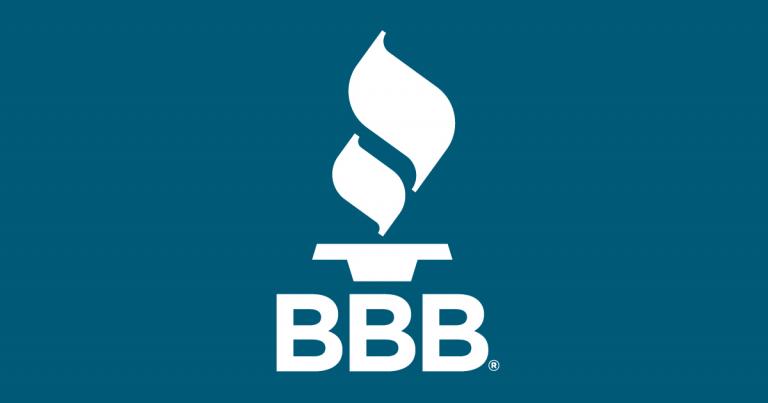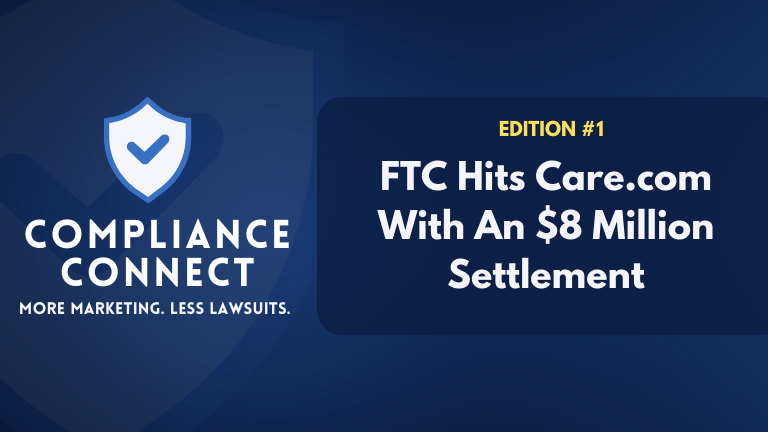This is the first edition of the Compliant Connect newsletter.
The goal is simple: to keep you in the loop on what the FTC and other regulatory agencies are up to.
In addition to sharing the latest news, we’ll arm you with the knowledge so that you can stay off the FTC’s radar…
- The latest COMPLIANCE NEWS
- Case breakdowns
- FAST compliance tips
- Mailbags from attorney Greg
- FTC horror stories
- Good and bad marketing examples
- and anything else that will help keep you compliant
These newsletters will land in your inbox twice a week – Mondays and Thursdays.
Let’s get down to business! Here’s what you need to know today…
- New Settlement – Care.com Must Pay $8.5 Million for Misleading Caregivers
- Non-Compete Ban BLOCKED – Federal Judge Slams The Brakes On New Rule
- Higher Telemarketing Fees – Cost Of Accessing Key Registry Going Up
- Cancellation Problems – What We Can Learn From The Care.Com Case
- BBB Blues – How Ignoring This Website Could Get You On The Government’s Radar
Compliance Digest: Your Daily News Download
Care.com Hit With An $8.5 Million Settlement
The FTC claims the popular platform deceived customers about the number of jobs available and made it hard for people to cancel their memberships.
This is just another example of how aggressive the FTC is getting. We break down the case below…
A federal judge in Texas blocked a new FTC rule that would’ve banned most non-compete agreements in employee contracts.
The rule was set to take effect on September 4. The case will likely be appealed.
Related: Greg breaks down an alternative approach to non-competes in this episode of the Don’t Say That podcast.
Do Not Call Registry Fees Going Up
If your business calls prospects who have NOT given you explicit consent to be contacted, you must confirm that they aren’t on the Do Not Call Registry.
The fee to access the Do Not Call Registry will increase to $80 for a single area code and $22,038 for all area codes in the United States…

Key Takeaways From The Care.com Settlement
Care.com just agreed to an $8.5 million settlement with the FTC.
So, why should you care? Even if your business has nothing to do with caregivers, there are some CRUCIAL LESSONS to learn here.
First, some context. Care.com is a platform that connects people who need help with caring for children and elderly people with caregivers.
According to Care.com, 29 million people have used the platform.
Before we dive into the details, I want to be clear: Care.com did NOT admit to wrongdoing. The accusations come from the FTC, not an admission of guilt from Care.com.
I have links to the FTC and Care.com’s press releases below.
Let’s break down what the FTC accused Care.com of doing—and what you can learn from it.
Here’s What The FTC Says Care.com Did Wrong…
#1 – Misleading Net Impression
Care.com claimed there were a lot of job opportunities on their app for caregivers who signed up for a premium account. They even gave SPECIFIC NUMBERS depending on where you lived.
However, many job listings came from free users who couldn’t even see who applied to them. Caregivers who signed up couldn’t apply for those jobs.
While those jobs were technically on the platform, this created a misleading “NET IMPRESSION” since reasonable customers would assume they had a reasonable shot at all those jobs.
#2 – False Earnings Claims
Care.com boasted about how much caregivers could earn on their platform.
According to the complaint, Care.com didn’t have documentation that backed up those earnings claims. They also couldn’t prove what the TYPICAL caregiver made using the platform.
#3 – Difficult Cancellation Process
The FTC also claims Care.com made it hard for users to cancel their memberships.
According to the Restore Online Shoppers Confidence Act (ROSCA), if you have a recurring program, you must disclose how members can cancel their subscriptions.
Care.com was accused of requiring users who wanted to cancel to jump through hoops by clicking hard-to-find links, filling out surveys, and getting messages discouraging them from canceling.
So, what key takeaways should every business owner take away?
- Substantiate Earnings Claims: Only make earnings claims if you have concrete data to support what a typical user can expect. Making unsubstantiated claims puts you at risk of violating FTC regulations.
- Be Transparent with Statistics: Make sure your stats and figures don’t just look good on paper—they need to create an accurate net impression. Even 100% accurate data can be misleading if not presented properly.
- Easy Cancellation: If you offer any membership or subscription services, tell new users how to cancel and make it EASY. This isn’t just good customer service; it’s a requirement under the Restore Online Shoppers Confidence Act (ROSCA) and multiple state laws.
If you want to stay off the radar of regulatory agencies like the FTC, then these are CRUCIAL lessons.
Did You Know…
In New York, you could face more than $50,000 in fines if you call a client to solicit services after 9:00 pm, EST.

Fast Compliance Tip: The Better Business Bureau
After several high-profile scams, the Better Business Bureau (BBB) was founded in 1912.
The most famous was when Charles Ponzi made millions of dollars recruiting investors to recruit other investors.
If you draw it out, it kind of looks like a pyramid…
Anyway, the BBB’s job is to help people TRUST businesses. They let customers complain and give businesses a chance to fix problems.
The BBB is NOT a government agency… but government agencies DO pay attention to it.
One big mistake businesses make is ignoring complaints from the BBB. It’s CRUCIAL to listen to your customers and fix their concerns.
Even though the BBB isn’t the government, complaints can still end up with government agencies like the FTC, which could lead to bigger problems.
The government tracks complaints from places like the BBB in their Consumer Sentinel Network. If a company gets a lot of complaints, it can get unwanted attention from the government. So, it’s not wise to ignore BBB complaints.
There are more reasons to pay attention to your company’s BBB page…
- Complaints can teach you a lot about what your customers want and need.
- Feedback helps you make sure your advertising matches what you deliver.
- You can reach out to unhappy customers and try to address their complaints.
Remember, having a good record with the BBB doesn’t mean you’re safe from being investigated by the government. However, keeping an eye on your BBB standing is still a good idea.
